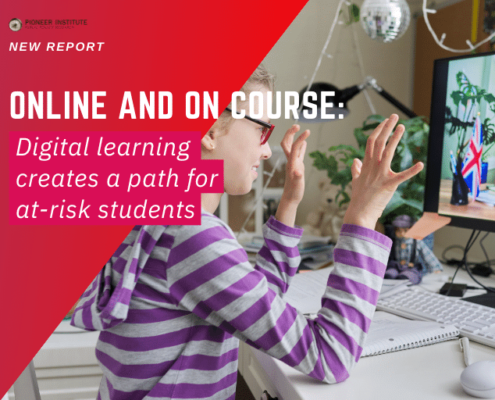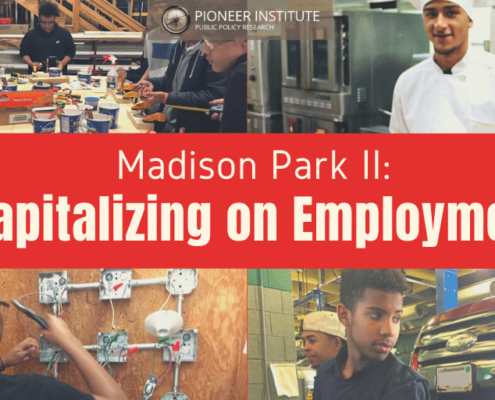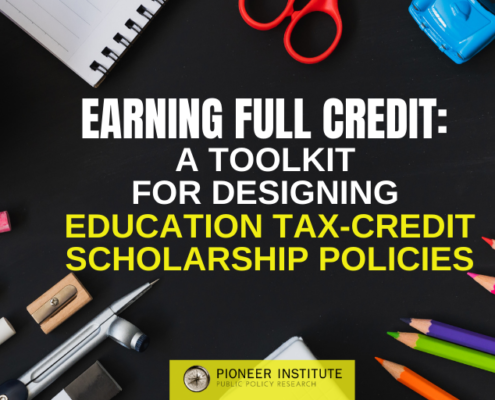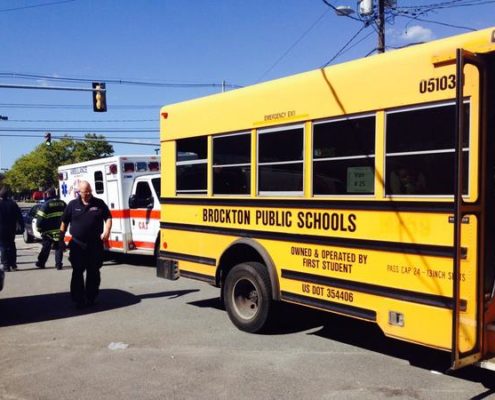
MBTAAnalysis: A look inside the MBTA
0 Comments
/
The MBTA shuttles over a million passengers a day around Greater…
 https://pioneerinstitute.org/wp-content/uploads/CloseupClock-1.jpg
739
1244
Mary Connaughton
https://pioneerinstitute.org/wp-content/uploads/logo_440x96.png
Mary Connaughton2017-02-20 12:34:192017-02-21 09:47:58The Clock is Ticking…….
https://pioneerinstitute.org/wp-content/uploads/CloseupClock-1.jpg
739
1244
Mary Connaughton
https://pioneerinstitute.org/wp-content/uploads/logo_440x96.png
Mary Connaughton2017-02-20 12:34:192017-02-21 09:47:58The Clock is Ticking…….
Mountain State Modifications: Tiffany Uses ESA Flexibility to Pivot Quickly For Her Son’s Education
This week on Homeschooling Journeys, we meet Tiffany Hoben from West Virginia. Curious Mike chatted with her twice: once in June 2024, and again in October 2024. This October episode shows the nature of homeschooling: plans change. That cuts both good and bad. One cool opportunity disappeared; but at roughly the same time, a new need emerged, as well as the perfect educator to solve that problem. Tiffany, like other homeschoolers using Education Savings Accounts (ESAs), has a variety of experiences: she gets to personalize her son's education, but in doing so, experiences friction that comes both from DIY and from the red tape of actually making purchases (software challenges and bureaucratic hoops). Her $4,900 “Hope Scholarship” is used for her son’s biology curriculum, rock climbing, an AI-aided writing class, and above all, a specialized phonics tutor. She is optimistic about the future of ESAs for homeschoolers in West Virginia.

Homeschooling with Hope: Katie Switzer’s ESA Experience
In this episode of Homeschooling Journeys with Curious Mike, Katie Switzer from West Virginia shares her compelling story as a homeschooling mom navigating the state's Hope Scholarship program. She recounts her pivotal role as a plaintiff in the legal battle that saw the scholarship declared unconstitutional by a West Virginia Circuit Court, only to be appealed to the state Supreme Court. Katie also sheds light on the frustrations and red tape surrounding the reimbursement process, a challenge many parents face when trying to access funds through the scholarship. Despite the hurdles, Katie successfully uses her Hope Scholarship for her children’s education, covering basic curriculum, speech therapy, piano lessons, and online classes with a beloved teacher, Miss Ashley. This episode provides an eye-opening look at the struggles and successes within the evolving landscape of school choice and education savings accounts.

Ashley Soifer on Microschools, Pods, & Homeschooling
This week on The Learning Curve, Ashley Soifer, Chief Innovation Officer of the National Microschooling Center discusses these innovative schooling options, in which families and innovators are using a wide array of education choices that offer parents flexibility and greater control over how, where, what, and when their children learn.

Why Massachusetts Should Be a Leader in Encouraging Education Entrepreneurship and Innovative K–12 Learning Models
This policy brief urges Massachusetts policymakers to encourage the proliferation and progress of non-traditional models that offer families creative, flexible, personalized and low-cost private education options.

A Tale of Two City Schools: Worcester Tech and Putnam Academy Become Models for Recovery
This report focuses highlights turnarounds at two Massachusetts schools, Worcester Technical High School and the Roger L. Putnam Vocational Technical Academy in Springfield, that were once known for high dropout rates and low graduation rates. The report shows that these schools now excel due to new leadership, community investment, and committed teachers. The report analyzes how Worcester Tech and Putnam Academy — schools with high numbers of low-income and special needs students — leapt from the bottom of Massachusetts voc-tech rankings to become leaders among local schools. The Pioneer paper includes interviews with administrators and presents several recommendations that could help transform struggling voc-tech schools.

METCO Funding: Understanding Massachusetts’ Voluntary School Desegregation Program
The Metropolitan Council for Educational Opportunity, or METCO program, has successfully educated thousands of students for 56 years, but several minor changes could make it even better, according to a new study published by Pioneer Institute.

Earning Full Credit: A Toolkit for Designing Tax-Credit Scholarship Policies (2022 Edition)
This report shows that education tax credits grew increasingly popular in 2021, with four more states enacting programs. There are now 28 tax-credit scholarship (TCS) programs in 23 states, and they serve more than 325,000 students.

Modeling an Education Savings Account for Massachusetts
This report finds that Massachusetts provides fewer options for students to be educated outside their assigned school districts than most other states do, and educational savings accounts (ESAs) offer an effective tool for giving students additional opportunities. Author Cara Candal proposes two potential ESA programs for Massachusetts.

Online and On Course: Digital learning creates a path for at-risk students
Digital learning, the use of computers and the internet to study courses taught in the classroom, is viewed by many educators as a breakthrough to helping those at-risk students stay in school and earn their diplomas. The flexibility afforded by digital learning, with students working on their own time at their own pace, is a way for students to meet the requirements of their courses while handling pressing responsibilities outside of school, problems at home or personal issues. Yet parents should scrutinize digital programs closely. Their quality and effectiveness vary widely. Students are poorly served by point-and-click assessments with no engagement, virtual schools with videos instead of real teachers and programs without pacing and scheduling support.

Homeschooling in Uncertain Times: COVID Prompts a Surge
After steadily increasing for years, the number of parents choosing to homeschool their children skyrocketed during the pandemic, and policy makers should do more to acknowledge homeschooling as a viable option, according to a new study published by Pioneer Institute.

Bad IDEA: How States Block Federal Special Education Funding to Private and Religious School Students
This report finds that two states and three school districts around the country for which data are available appear to be out of compliance with provisions of the federal Individuals with Disabilities Education Act (IDEA) that require provision of equitable, publicly funded special education services to students in private schools, after a $3.8 million settlement was reached in Massachusetts for failure to comply.

Madison Park II: Capitalizing on Employment Opportunity
This report reviews the co-operative education program at Boston’s Madison Park Technical Vocational High School, which places students in paid positions with local employers. The study finds that the program lags far behind other Massachusetts vocational-technical schools in terms of both placements and number of employer contacts. But with the school as a whole beginning to improve after years of turmoil, the co-op is also showing promising signs.

Earning Full Credit: A Toolkit for Designing Tax-Credit Scholarship Policies
Tax-credit scholarship (TCS) policies create an incentive for taxpayers to contribute to nonprofit scholarship organizations that aid families with tuition and, in some states, other K–12 educational expenses. This paper explores the central design features of TCS policies—such as eligibility, the tax credit value, credit caps, and academic accountability provisions—and outlines the different approaches taken by the TCS policies in each state. The paper also offers suggestions regarding each feature for policymakers who want to design a TCS policy that most likely to succeed at its central purpose: empowering families to provide their children with the education that works best for them.

An Analysis of How Massachusetts’ ‘Student Growth’ Model Limits Access to Charter Public Schools
The Student Growth Percentile (SGP) the Massachusetts Department of Elementary and Secondary Education (DESE) now uses as 25 percent of the formula for determining school district rankings has a high degree of error. While the SGP may have a role to play as part of discussions around holding districts accountable for performance, it should not be used for high-stakes policy decisions, including which districts are eligible for an increase in the charter public school cap.

Amicus Brief: Espinoza v Montana Department of Revenue
Pioneer Institute today announced that it has submitted an amicus curiae urging the United States Supreme Court to hear Espinoza v. Montana Department of Revenue, which challenges a state constitutional amendment marked by religious bias.

Wise and Humane: Private School Nursing in Massachusetts
Private and parochial school students in Massachusetts have been denied well over $10 million in school nursing services to which they are entitled under state law.

Charter School Funding in Massachusetts: A Primer
A new Pioneer Institute study finds that foundation districts are largely unaffected by students who choose to transfer to charter schools.

Axioms of Excellence: Kumon and the Russian School of Mathematics
At a time of declining state and national math proficiency, after-school math programs offer a viable option for quickly increasing the number of mathematically competent students. In this study, Pioneer Institute profiles two such programs: Kumon and the Russian School of Mathematics.

Common Core, School Choice and Rethinking Standards-Based Reform
While U.S. academic performance has declined since the broad implementation of Common Core, school choice programs are increasingly hamstrung by regulations that require private schools to adopt a single curriculum standards-based test as a condition for receiving public money, according to a new study published by Pioneer Institute.

Inter-district Choice in Massachusetts
With little fanfare or controversy, Massachusetts’ inter-district school choice program has allowed students to access better schools and spurred competition between districts, but the 27-year-old choice law should be updated to ensure the program’s continuing success.

No IDEA: How Massachusetts Blocks Federal Special Education Funding for Private and Religious School Students
Over the past dozen years, thousands of private and religious school students in Massachusetts have been denied hundreds of millions of dollars’ worth of special education services to which they are entitled under federal law.

Cristo Rey Schools: A Model of 21st-Century Catholic Education
This paper examines Cristo Rey schools, why they work, how they work and what parts of their education/business design can be successfully transferred to other Catholic high schools. It will look at the Cristo Rey Network, a cooperative organization formed to standardize the Cristo Rey approach, offer resources to the individual schools and help promote the spread of Cristo Rey schools to cities that can support them.

Expanding Educational Opportunities: Three Models for Extended Summer Enrichment Programs in Massachusetts
The last of a three-part series by Pioneer Institute on summer learning shows that Massachusetts schools establishing summer enrichment programs to close the achievement gap between lower-income and higher-income students can have a greater impact by eventually expanding the program across multiple summers or for a full year. This final paper introduces three types of extended summer enrichment models: 12-month programs, multi-year summer-only programs, and multi-year, year-round programs.

Homeschooling: The Ultimate School Choice
This report recommends that states do more to acknowledge the…

Best Practices in Massachusetts Charter Schools: What We Know Now
This report summarizes the research-based truth about Massachusetts charter public schools, focusing on the ideas that were most prominent in the charter school ballot initiative debate. The data that follow are taken from a series of papers published by Pioneer Institute over the course of 2016. This report illustrates that Massachusetts charter public schools do not drain resources from district schools, they outperform the school districts from which their students come, and have attrition rates that are lower than or equal to those districts.

Attrition, Dropout and Student Mobility in District and Charter Schools: A Demographic Report
This paper uses publicly available DESE data to explore student attrition and other forms of student movement, such as dropouts, within district and charter schools. It is not a direct response to the now dated MTA report, but it does explore the validity of the claim that Massachusetts charter public schools have higher attrition than their district counterparts because these schools “select out” or “push out” weaker students in an effort to produce higher test scores.

Massachusetts Charter Public Schools Best Practices in Expansion and Replication
This paper considers what the limited expansion of some charter organizations in the Commonwealth has looked like so far, and explores the different legal and policy conditions that enable large charter and educational management organizations to flourish. It does so with an eye to understanding whether Massachusetts might benefit from policy changes that encourage the expansion of operators already in the state and provide incentives for successful outside operators to bring their programs to the Commonwealth. Recommendations include providing pathways for new, innovative providers to enter the state.

Massachusetts Charter Public Schools English Language Learners: Demographic and Achievement Trends
The following paper describes how charter schools in Massachusetts and especially in Boston enroll and serve English language learners. Another report in this series provides similar information about students with disabilities. This paper provides enrollment, attrition, and achievement data for English language learners in charter schools across the Commonwealth, with a concentration on Boston and Gateway Cities such as Lawrence.

Expanding Educational Opportunities: Best Practices in U.S. Summer Enrichment Programs
This report is the second of a three-part Pioneer Institute series of studies on summer enrichment programs with a particular focus on opportunities for disadvantaged students. It highlights best practices in the field by profiling a range of summer programs. The authors urge summer enrichment programs to partner with entities that help place disadvantaged children in educational programs to help the schools and non-profits recruit students. They also urge programs run by schools to use academic-year faculty.

Massachusetts Charter Public Schools: Best Practices in Character Education
This report explores two high performing Massachusetts charter public schools—Abby Kelley Foster Charter School in Worcester, MA and the Brooke Charter School Network of Boston, MA—and how they approach character education. This study is part of a series of papers from Pioneer highlighting best practices in the charter sector.
